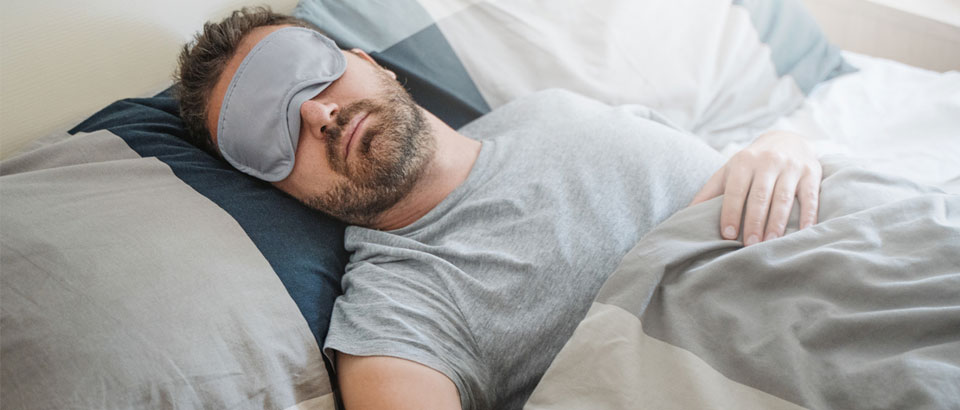September 11, 2023
According to the National Safety Council, more than 43 percent of workers are suffering from sleep deprivation1 and can cost employers up to $3,100 per worker each year.1
Studies have shown that people who get more restful sleep are better able to focus, think critically, solve problems and manage stress.2 On the other hand, those with poor sleeping habits are at greater risk of accidents in the workplace, reduced job satisfaction and higher absenteeism.3
But it isn’t just about quantity. Disrupted sleeping patterns can also lead to fatigue, irritability, decreased cognitive performance and even physical health issues such as headaches or weakened immune systems.4 For business owners, this means a decrease in productivity across the organization due to increased absenteeism or presenteeism (working while feeling unwell). It could even be detrimental to customer service if employees are too tired to give their best effort when dealing with customers.
What can you do to help your workforce get the rest they need so they – and your company’s bottom line – stay healthy? We’ve put together some tips to get you started.
Know the Difference Between Sleep Deprivation and Deficiency
We all know that getting a good night's sleep is essential for our health and well-being. But what many may not realize is that sleep patterns can have a direct impact on the productivity and success of their business. In order to recognize the symptoms of poor sleep, it’s important to understand the difference between sleep deprivation and deficiency.

Sleep deprivation means not getting enough sleep.5 It can be occasional or chronic, and it’s often caused by making the wrong decisions about sleep habits, such as staying up too late or not keeping a regular sleep schedule. Some health problems can also contribute to sleep deprivation, including anxiety, chronic pain and sleep disorders.
Sleep deficiency is a different kind of sleep problem. Being sleep deficient means not getting 7-9 continual hours of restful sleep6 for the body to rest and recharge. It can be connected to sleep deprivation, but sleep deficiency can mean more serious problems, like falling asleep during waking hours, having difficulty with concentration and undergoing mood shifts and depression. It can even leave the body more sensitive to pain and at a greater chance of developing high blood pressure.6
Both sleep deprivation and sleep deficiency cause significant problems for those suffering from either or both conditions. Let’s look at the potentially serious effects of both:
Effects of Sleep Deprivation6
- Difficulty concentrating
- Mood swings
- Depression
- Increased risk-taking behavior
- Weight gain
- Weakened immune system
Effects of Sleep Deficiency6
Increased risk of:
- Type 2 diabetes
- Heart disease
- Stroke
- Mental health issues
Issues with chronic health problems, including:
- Obesity
- Kidney disease
- High blood pressure
The effects of disturbed sleeping patterns extend beyond physical health issues; they can also lead to mental health issues such as depression or anxiety which can further hamper performance at work.5 Poor sleep quality has been linked to signs of burnout including exhaustion and feelings of detachment from work,7 which is something that no business owner wants for their employees or their organization as a whole.
What Leads to Sleep Disruptions?
Just like with any other health issue, figuring out the root cause of sleep issues can help patients and their medical providers figure out what to do about it. Here are a few of those issues:
- Sleep apnea which impacts the ability to breath properly while a person is asleep.8
- Insomnia isn’t technically a sleep disorder. It is a sleep complaint that is usually a symptom of an underlying problem. Insomnia means having trouble falling asleep and staying asleep. It can be acute, lasting only a few days, or chronic, happening more than three times a week for more than a month.9
- Mental health issues and sleep disorders may be linked. Not getting enough sleep is linked to mental health problems including anxiety, depression, bipolar disorder, OCD and PTSD. Sleep deprivation is also known to seriously worsen the symptoms of mental health problems and can even decrease how well treatments work.10
- Shift work sleep disorders happen when graveyard or early morning work schedules make it difficult to maintain a regular sleep schedule. People with this sleep disorder sleep an average of four hours less per night than people without it. It can cause difficulty falling and staying asleep as well as severe fatigue.11
Studies also show that employees who work these schedules may face higher risks for serious health problems, such as heart attack and diabetes. These adverse effects can also include an increased risk of accidents, certain forms of cancer and metabolic syndrome, which is a mixture of conditions that raises the body’s risk for diabetes, stroke and heart disease.12
How Can You Help Your Employees?
The main goal is to allow them to maintain a strong circadian rhythm, which are the internally driven cycles that help us to fall asleep at night and wake up in the morning.13
Working graveyard or early morning shifts can disrupt the way the body’s circadian rhythm operates. If your company works these hours, offer the following tips to your workforce:
- Examine existing conditions. Business owners should conduct a study that considers current shifts and employees' sleep patterns. Doing this will allow them to identify areas where they could make improvements, such as the length of shifts. It is also critical to understand any legal regulations concerning shift changes in your local area or state.
- Keep a consistent work schedule. As an employer, you should minimize the consecutive number of days your employees work these challenging shifts. You may also consider rotating shifts among a team or department to guarantee everyone gets enough restful hours.
- Stagger shifts. An effective technique is by offering split shifts, so some team members start earlier while others begin later, allowing each team member time for recovery between shifts. You can further encourage your workforce by providing bonuses or other incentives for those who participate in rotating schedules. This could lead to improved morale among staff members as well as higher productivity levels overall.
- Remain open. Inform your workforce if that if any employee needs a more flexible schedule, they should speak with you.
How to Explain Sleep Hygiene to Your Employees
No matter what hours your employees work, they can benefit from creating good sleep habits, also known as sleep hygiene. Here are some tips to share with them:13
- Follow a consistent sleep schedule. Go to bed and wake up at the same time every day, even on weekends and holidays. Make sure that bedtime includes seven to eight hours of uninterrupted sleep, if possible.
- Be careful with naps. Too many naps, as well as ones too late in the day or that last for too long can keep people from falling and staying asleep.
- Create a good sleep environment. The bedroom should be dark, quiet and relaxing. Keep it cool as well – medical experts recommend a bedroom temperature between 60- and 67-degrees Fahrenheit.
- Keep electronic devices out of the bedroom, including phones, computers and even the television. Try not to use or watch electronics for at least an hour before bedtime.
- Avoid bright light after overnight shifts. Employees who work midnight to morning shifts will sleep more soundly and achieve better rest if they reduce their light exposure and sleep immediately after getting home. They may also see benefits from blue light blocking glasses or using blackout shades in their bedrooms.
- Set up a consistent sleep schedule on days off. On days when they do not work a graveyard or early morning shift, they should attempt to sleep as much as possible while sticking to a similar sleep schedule.
- Avoid caffeine, alcohol and large meals before bed. A healthy diet and regular exercise can help some people sleep better. Remember to talk to a provider before beginning any new exercise regime.
When Does Lack of Sleep Become a Problem?
An occasional sleepless night or bout of insomnia is common. But when lack of sleep disrupts someone’s daily life, it may be time to see a medical professional. Reasons to speak with a provider about sleep concerns include:
- Sleep issues have lasted for more than three months
- Excessive sleepiness interferes with work or normal daily life, even after sleeping for seven hours the night before
- Memory issues
- Loud snoring
- Falling asleep involuntarily
The first step is meeting with a provider, who will conduct a physical exam and discuss the sleep issues. If more information is needed, they may refer the patient to a sleep specialist who has a background in neurology, psychiatry or pulmonology along with specialized training in assessing sleep disorders.
Supporting Your Workforce
Remind your employees: If they are having sleep issues, they are not alone. Encourage them to speak with their medical provider to make a plan for getting a good night’s sleep. Tell them that quality sleep can lead to improvement in their overall health and share the tips in this article.
are you an employer?
Learn how our full range of occupational medicine and urgent care can help your workforce.
References:
1 CDC. Sleep and Sleep Disorders. Last updated September 7, 2022. Accessed June 5, 2023.
2 National Safety Council. Fatigue – You're More Than Just Tired. Accessed June 5, 2023.
3 NHLBI. How Sleep Effects Your Health. Last updated June 15, 2022. Accessed June 5, 2023.
4 NHLBI. Sleep, Health and Wellness at Work: A Scoping Review. Last updated November 16, 2017. Accessed June 5, 2023.
5 American Psychological Association. Growing concerns about sleep. Last updated June 1, 2021. Accessed June 6, 2023.
6 American Heart Association. What is good sleep and how much do I need? Last updated March 25, 2020. Accessed June 28, 2023.
7 National Heart, Lung and Blood Institute (NHLBI). What Are Sleep Deprivation and Deficiency? Last updated March 24, 2022. Accessed June 5, 2023.
8 Harvard Business Review. How Much Is Bad Sleep Hurting Your Career? Last updated July 27, 2020. Accessed June 6, 2023.
9 NHLBI. What is sleep apnea? Last updated March 22, 2022. Accessed June 6, 2023
10 NHLBI. What Is Insomnia? Last updated March 24, 2022. Accessed June 6, 2023.
11 National Alliance on Mental Health (NAMI). Sleep Disorders. Accessed June 6, 2023.
12 Harvard Health Publishing. Shift work can harm sleep and health: What helps? Last updated February 28, 2023. Accessed June 6, 2023.
13 Journal of Clinical Sleep Medicine. Shift work and health outcomes: an umbrella review of systematic reviews and meta-analyses of epidemiological studies. Last updated February 2022. Accessed June 6, 2023.

